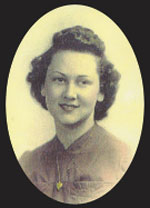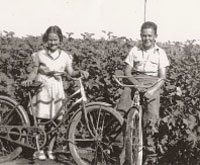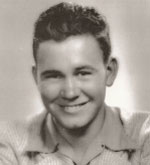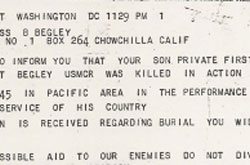Lavada Peterson
(Maiden Name: Begley)
Office worker in an essential industry
 |
| Lavada in the 1940s. |
| Born: 1928 |
Residence:
Los Gatos, CA
United States |
Original home:
Chowchilla, CA
United States |
December 7, 1941 will be etched in my mind forever. I can tell you every thought I had, where I was and who I was with when Japan attacked our nation.
But let us fast-forward to August 14, 1945, the day World War II ended and America declared victory. I cannot tell you where I was, or whom I was with or what I was doing. My mind has blocked out all of the happenings on that day. I can only tell you what I was feeling.
I felt lonely on August 14, 1945.
Six months before the war ended my brother, Tommy Begley, a Marine, was killed while serving in the Pacific. Whatever happened in the war after his death was still a concern for me but, I did not track it as carefully as I did before his death. Our family paid the ultimate sacrifice. We would never see Tom again. My mother and dad gave their only son, my sister and I gave our only brother. There was no more to give; we had given all.
When the people of our little town celebrated our victory over the Axis powers, I was sad, maybe even a little angry knowing that Tom would not come home, but I also felt happy to know the war was over. Our country had endured forty-five months of bloodshed and sorrow. Now it was time to embrace peace. Peace at last.
The days following the armistice presented a new challenge for me. The service men started coming home. There were Tom's classmates who had served in the military, the neighbor boys who returned and tried to put their lives together again, our cousins who served in various battles all over the world, and his church friends who came up to me to shake my hand.
I was wondering how I would accept these men who escaped the horrors, the agony of death. I soon discovered these young men felt pain and loneliness just as I did. They truly cared for their friends who were left on foreign soil, came home in a casket or lay in the ocean deep. They expressed compassion for their fallen comrades. They spoke kind words; words of understanding and sympathy. Their devotion and loyalty to those who never returned was sincere and true.
No, I cannot tell you all the details of August 14, but I can tell you of the love and sympathy of the days that followed I cannot adequately express my gratitude for their generosity, their love, and the sympathy these veterans expressed to me. My concerns were soon banished.
August 14, 1945 was a new beginning for America.
 |
|
 |
|
 |
| Lavada and Tommy as children. |
|
Tommy Begley, Lavada's brother, U.S. Marine. Killed off of Iwo Jima, February 1945. |
|
Excerpt from telegram notifying the family of Tommy's death. |
Submitted by:
Warren C.. Hegg
Los Gatos, CA - United States
Relationship to Storyteller:
Adult voluntee |